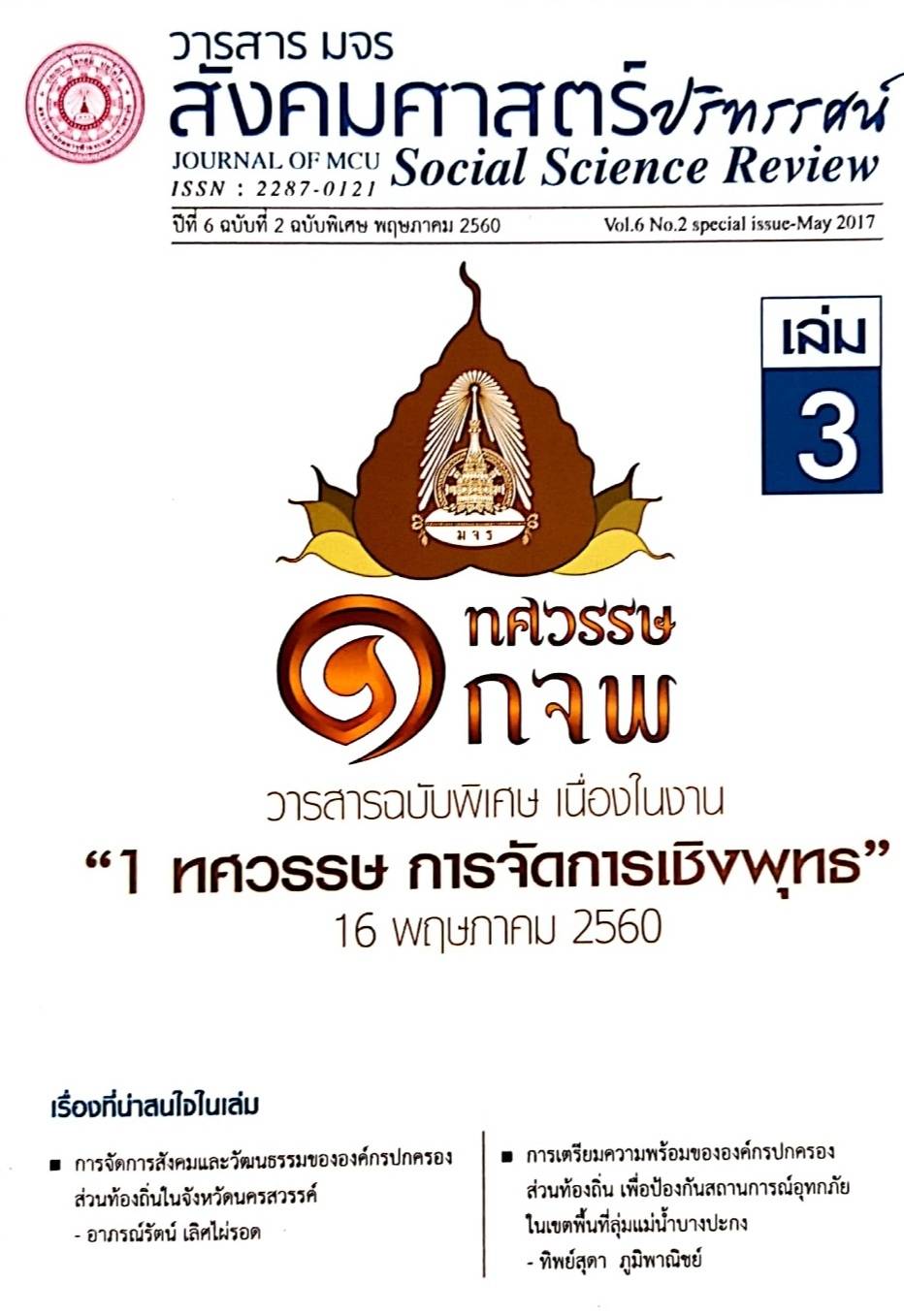วิพากษ์ทฤษฎีวาทกรรมแห่งกฎหมายของฮาเบอร์มาส
บทคัดย่อ
การวิจัยเรื่อง “วิพากษ์ทฤษฎีวาทกรรมแห่งกฎหมายของฮาเบอร์มาส” มีวัตถุประสงค์ 3 ข้อดังนี้ (1) เพื่อศึกษาทฤษฎีวาทกรรมแห่งกฎหมายของฮาเบอร์มาส (2) เพื่อศึกษาปรัชญากฎหมายที่มีอิทธิพลต่อทฤษฎีวาทกรรมแห่งกฎหมายของฮาเบอร์มาสและ(3) เพื่อวิพากษ์ทฤษฎีวาทกรรมแห่งกฎหมายของฮาเบอร์มาส การวิจัยนี้เป็นการวิจัยเชิงเอกสาร
การศึกษาวัตถุประสงค์ข้อที่ 1 พบว่า การศึกษาทฤษฎีวาทกรรมแห่งกฎหมายของฮาเบอร์มาส สะท้อนถึงความคิดและมุมมองทางกฎหมาย 2 ประเด็นดังนี้ 1.แนวคิดความชอบธรรมทางกฎหมาย แนวคิดนี้อาศัยประสิทธิภาพในการจัดทำกฎหมายและ 2.การบังคับใช้กฎหมายตามสิทธิเสรีภาพของประชาชนเพื่อให้เกิดความยุติธรรม เชื่อว่าทั้งสองแนวคิดนั้นทำให้แนวคิดบรรทัดฐานกฎหมายของฮาเบอร์มาสมีความถูกต้อง
การศึกษาวัตถุประสงค์ข้อที่ 2 พบว่า แนวคิดปรัชญากฎหมายที่มีอิทธิพลต่อทฤษฎีวาทกรรมแห่งกฎหมายของฮาเบอร์มาสมีดังนี้ 1.กฎหมายธรรมชาติ ที่สนับสนุนการดำรงอยู่ของหลักจริยธรรมทางกฎหมาย 2.แนวคิดของคานท์ การแบ่งแยกระหว่างความถูกต้องทางศีลธรรมและความถูกต้องทางกฎหมาย ในเรื่องนี้ฮาเบอร์มาสถือว่าขอบเขตของศีลธรรมที่มีคุณค่ามากกว่ากฎหมาย 3.แนวคิดของมาร์กซิสต์ แนวคิดนี้ถือว่าการต่อสู้ภายในประชาสังคมเป็นสิ่งจำเป็น แต่ทรรศนะของฮาเบอร์มาสเห็นว่าต้องรักษาผลประโยชน์ทางชนชั้นของแต่ละฝ่ายไว้
การศึกษาวัตถุประสงค์ข้อที่ 3 พบว่า จากการวิพากษ์ทฤษฎีวาทกรรมแห่งกฎหมายของฮาเบอร์มาส ผู้วิจัยเห็นว่าการเมืองและกฎหมายจะทำงานไม่มีประสิทธิภาพถ้าปราศจากศีลธรรมและความชอบธรรมทางกฎหมาย กฎหมายจึงมีความสัมพันธ์กับศีลธรรม ศีลธรรมและกฎหมายหากแยกจากกัน สังคมจะไม่ปกติสุขเพราะมีการละเมิดซึ่งกันและกัน ดังนั้นทฤษฎีทางการเมืองและทฤษฎีทางกฎหมายจึงมีพื้นฐานบนแนวความคิดทางทฤษฎีทางจริยศาสตร์
เอกสารอ้างอิง
ธีรยุทธ บุญมี. (2547). ประชาสังคม. กรุงเทพมหานคร : สำนักพิมพ์สายธาร.
โสรัจจ์ หงศ์ลดารมภ์. (พฤษภาคม 2555): “กฎหมาย ประชาธิปไตย กับฮาเบอร์มาส”. การอบรมวิชาการ นิติรัฐกับปรัชญา. สมาคมปรัชญาและศาสนาแห่งประเทศไทย จุฬาลงกรณ์มหาวิทยาลัย
Ayn Rand. (1964). The Virtue of Selfishness. New York. USA : The New American Library.
David Dyzenhaus. (1997). Legality and Legitimacy. Oxford. Clarendon Press.
Kaarlo Tuori. (2002). Critical Legal Positivism. Aldershot: Ashgate.
Patricia Smith. (1993). Feminist Jurisprudence. New York : Oxford University Press.
William Rehg. (1996). Between Facts And Norms : Contributions to a Discourse Theory of Law and Democracy. Cambridge : Polity Press.
ดาวน์โหลด
เผยแพร่แล้ว
รูปแบบการอ้างอิง
ฉบับ
ประเภทบทความ
สัญญาอนุญาต
ลิขสิทธิ์ (c) 2020 วารสาร มจร สังคมศาสตร์ปริทรรศน์

อนุญาตภายใต้เงื่อนไข Creative Commons Attribution-NonCommercial-NoDerivatives 4.0 International License.
เพื่อให้เป็นไปตามกฎหมายลิขสิทธิ์ ผู้นิพนธ์ทุกท่านต้องลงลายมือชื่อในแบบฟอร์มใบมอบลิขสิทธิ์บทความให้แก่วารสารฯ พร้อมกับบทความต้นฉบับที่ได้แก้ไขครั้งสุดท้าย นอกจากนี้ ผู้นิพนธ์ทุกท่านต้องยืนยันว่าบทความต้นฉบับที่ส่งมาตีพิมพ์นั้น ได้ส่งมาตีพิมพ์เฉพาะในวารสาร มจร สังคมศาสตร์ปริทรรศน์ เพียงแห่งเดียวเท่านั้น หากมีการใช้ภาพหรือตารางหรือเนื้อหาอื่นๆ ของผู้นิพนธ์อื่นที่ปรากฏในสิ่งตีพิมพ์อื่นมาแล้ว ผู้นิพนธ์ต้องขออนุญาตเจ้าของลิขสิทธิ์ก่อน พร้อมทั้งแสดงหนังสือที่ได้รับการยินยอมต่อบรรณาธิการ ก่อนที่บทความจะได้รับการตีพิมพ์ หากไม่เป็นไปตามข้อกำหนดเบื้องต้น ทางวารสารจะถอดบทความของท่านออกโดยไม่มีข้อยกเว้นใดๆ ทั้งสิ้น





